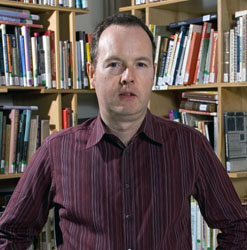Professor's research shines light on attitudes in a contested region of Georgia

It may not be a surprise but it is now an empirically documented fact. National identity trumps everything else when it comes to predicting the attitudes of people in the deeply contested region of Abkhazia.
When respondents in this region -- once a part of Georgia, but a de facto state with its own independent government since 1993 -- were asked a range of questions about social, political, and economic issues, it was found that nationality, rather than gender or age (Soviet versus post-Soviet generation), was the single most significant predictor of attitudes.
This is the major finding in a public opinion survey among 1,000 Abkhaz conducted in March and April of this year by Gerard Toal, professor and director of Virginia Tech's Government and International Affairs program in the National Capital Region; Professor John O’Loughlin, Institute of Behavioral Science and Department of Geography, University of Colorado, Boulder; and Professor Vladimir Kolossov, Institute of Geography, Russian Academy of Sciences, Moscow.
The survey also indicated that a majority are satisfied with the political situation in the region and prefer independence from Georgia.
Toal, O’Loughlin, and Kolossov, who have collaborated since 2001, recently made a presentation of these and other survey findings and data at the Kennan Institute, Woodrow Wilson Center, Washington, D.C.
The three researchers have authored an article which will appear in the August 2010 issue of Post-Soviet Affairs.
The survey is part of a broader social science project funded by the U.S. National Science Foundation (NSF), “The Dynamics of Secessionist Regions: Eurasian Unrecognized Quasi-States after Kosovo's Independence,” which aims to measure the attitudes of inhabitants in South Ossetia, Moldova, Transdniestria, Abkhazia, Kosovo, and Georgia.
During their presentation, Transdniestria, Abkhazia, and South Ossetia were described as de facto states, "secessionist regions that have established internal territorial sovereignty but lack widespread recognition and legitimacy as states in the international system." These states all arose after the breakup of the Soviet Union and share similar state-building aspirations. However, they differ in their histories of wartime violence, the relationship between titular groups and other populations, and the nature of their client-patron relationships with the Russian Federation.
Questions covering standard of living, state building, identity, external security, and potential for reconciliation were included in the survey. Responses show that Abkhaz, Russians, and Armenians tended to cluster, with most Abkhazian Georgians (those who declared themselves Georgians, Mingrelians, and Georgian-Mingrelians and live almost exclusively in the Gal(i) District of Abkhazia) often expressing contrasting views. Abkhaz and Armenians felt better off than others. A majority of Abkhaz felt their state had a better economic situation than Georgia, although most have not travelled to “Georgia proper” in recent years.
Among Abkhazia’s four major nationalities, Abkhaz were most proud of belonging to their ethnic group (though others expressed extremely high rates of pride as well). More than 70 percent of Abkhaz indicated they also had a Russian passport, with levels even greater among Armenians and Russians. Approximately half of Georgian respondents indicated they had an Abkhazian passport. High numbers of all nationalities indicated they had never felt discriminated against where they currently live but amongst Georgians there was a distinct minority who did not feel the same.
Most Abkhazian residents felt that the problem of a renewed war with Georgia was no longer a major worry. Toal explained that “after August 2008, which saw the introduction of large numbers of Russian troops along the Inguri river separating Abkhazia and Georgian proper and the recognition of Abkhazia as an independent state by the Russian Federation, the non-Georgian majority within Abkhazia have crossed a mental threshold and feel done with Georgia.” The legacy of the 1992-93 war remains, however, said Toal.
The largest divide in the whole survey between nationalities was in response to the question: "Would you be willing to accept the full return of Georgian refugees to Abkhazia in return for Abkhazia’s recognition as a state by the West and the rest of the international community?" More than 80 percent of Abkhaz and Armenians said “no” and only a few indicated “yes,” whereas 34 percent of Georgians answered affirmatively (almost as many Georgians chose ‘”hard to say”).
Ultimately, the survey found that Abkhazia is a divided society, with the non-Georgian nationalities unwilling to consider themselves a part of Georgia or to countenance the return of those displaced by war from the region.




